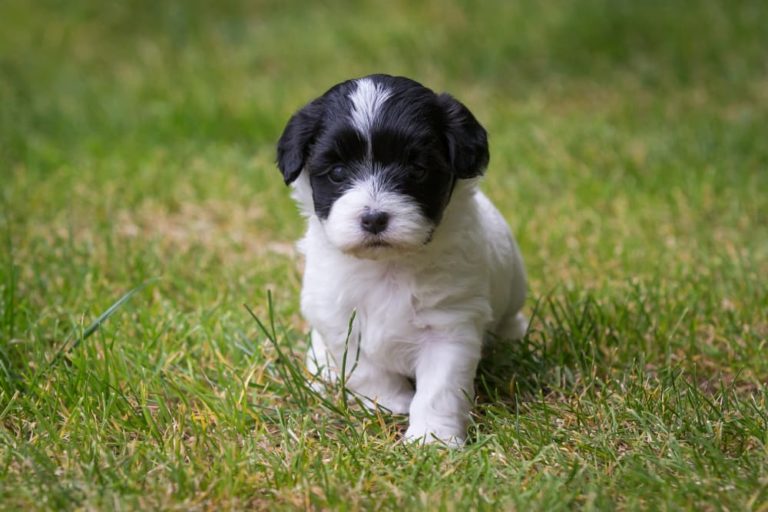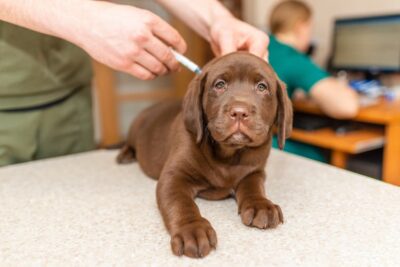How Often Do Puppies Poop?

If you’ve got a new puppy, you’re probably already aware that pee and poop are a big part of the package. The sheer volume of output might leave you wondering how often do puppies poop, or what to do if you’ve got a puppy not pooping. Helping your pup learn the ins and outs of potty training means that you’re probably spending plenty of time getting acquainted with your best friend’s bathroom habits, including potty location, frequency, consistency, color, and yes, even odor.
It’s understandable to have questions when it comes to the business of #2, partly because it’s one of the least pleasant aspects of pet parenthood (who likes cleaning up all those piles?) and also because your pup’s “deposits” are a major indicator of overall health. But how much is too much, and what can you do if you’re worried about a decrease in poop output?
How Often Do Puppies Poop?

The combination of a pup’s small size, developing digestive tract, frequent meals throughout the day, and nutrient-rich food means that puppies poop a lot. While there’s no across-the-board standard for how often puppies need to poop, most pups between the ages of 8 and 16 weeks have bowel movements an average of four to six times per day, and some have even more. The exact number of times a puppy poops each day varies based on factors that include your pup’s size (a bigger puppy + more food = more poop) and the quality of food they eat. A low-quality dog food might not be easily digestible, resulting in greater output, as well as loose, stinky, strangely-colored stool.
As puppies grow and mature, the fast and frequent poop production phase will decrease. By the time your puppy hits a year of age, they should be having the more typical adult bowel movement frequency of one to two times per day.
How Long Can a Puppy Go Without Pooping?
Consistent elimination (pooping and peeing) is an indicator of good health, so a sudden change in your pup’s pooping habits could mean that there’s an underlying issue that needs to be addressed. If a puppy who has been “regular” stops pooping for 24 hours or longer, schedule an appointment with your veterinarian to rule out any underlying medical issues, especially if the change in bowel movements is accompanied by a decreased appetite or vomiting. That said, not every reason behind a decrease in poop production is cause for alarm.
Puppy Not Pooping: Common Causes

There’s no single reason why a puppy isn’t pooping, and the following list includes the most common factors why a puppy hasn’t pooped in 12 hours or longer:
Stress
Pups who are just settling into their new home will likely be nervous about the lifestyle changes, leading to infrequent or even nonexistent defecation during the first few days. This can be normal and usually doesn’t require a veterinary visit, but if your puppy isn’t eating, make sure to consult with a veterinarian.
Blockage
Since puppies explore the world with their mouths and are willing to try to eat anything they can grab, the biggest concern with a puppy not pooping is an intestinal blockage. In addition to not pooping, signs that your puppy might have a blockage include a loss of appetite, depression, vomiting, unproductive squatting, and abdominal pain. If you suspect your puppy has eaten something inedible, like a sock or toy that can’t be passed naturally, see your veterinarian immediately. In rare cases, a blockage can be caused by intestinal parasites, specifically roundworms.
Rapid food switch
Changing a puppy’s food abruptly and without time to adjust to it might lead to a change in pooping habits, from a decrease in output to the opposite extreme, diarrhea. Similarly, switching from a low-quality food to a nutrient-dense food could lead to a decrease in output. If you’re changing your new puppy’s diet, make sure to do so slowly over 5 to 7 days to prevent stomach upset. Each day, add a little more of the new food and a little less of the old food until you’re feeding only the new diet. Whichever food you choose, make sure it’s appropriate for growing puppies!
Dehydration
A puppy who is not drinking enough water can end up constipated, which will lead to either dry, hard-to-pass poop, or no poop at all. Constipated puppies may strain to poop, have a decreased appetite, or throw up. Make sure your puppy always has access to fresh water. If your puppy isn’t drinking water, giving them canned food can increase their water intake due to the higher moisture content. On a hot day, you could make frozen snacks for your pet, which will help them take in more water and keep cool.
Medications
Some medications can impact a puppy’s elimination schedule, but since medications should only be given under a veterinarian’s supervision, your vet will advise about potential poop changes to watch out for. If you have any concerns about changes to your puppy’s poop habits after starting a medication, make sure to consult with your veterinarian before stopping any medications.
What To Do If Your Puppy Isn’t Pooping

A brief change in your puppy’s pooping habits isn’t a cause for concern, especially when coupled with new home stress or a change in food. However, an extended poop-free period coupled with any of the indicators of a blockage, like loss of appetite, abdominal pain, straining to eliminate or vomiting, requires immediate veterinary care.
In some cases, transitioning to a bland diet of boiled chicken and rice might help settle your pup’s stomach and level out any puppy pooping issues. Adding an appropriate amount of plain canned pumpkin (1 to 2 teaspoons for small pups and 2 to 3 teaspoons for a larger pup) to your puppy’s meals can also help to improve digestive health because of its high water and fiber content. Consult with your veterinarian before using a bland diet for your puppy. It’s best to err on the side of caution when it comes to elimination issues to keep your puppy happy and healthy.









